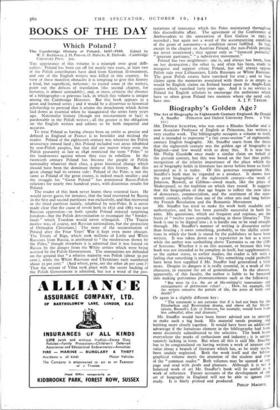Biography's Golden Age?
MR. DONALD STAUFFER, who was once a Rhodes Scholar and is now Associate Professor of English at Princeton, has written a very erudite work. The bibliography occupies a volume to itself, and is intended to represent "a fair cross-section" of eighteenth- century English biography. Mr. Stauffer starts from the thesis that the eighteenth century was the golden age of biography in England—and few would wish to deny this. It is true that Mr. Philip Guedaliti once made a similar claim on behalf of the present century, but this was based on the fact that public recognition of the relative importance of the place which the art of biography holds in literature has never before been so freely accorded as it is today. Of this generous recognition Mr. Stauffer's book may be regarded as a product. It shows how the great biographies of the eighteenth century—the work of Johnson, Boswell, or Gibbon—owed much, like the plays of Shakespeare to the tradition on which they rested. It suggests that the biographies of that age began to reflect the new ideas of democracy, commercialism, and the sentiment of the nine- teenth century, earlier than any of the other arts and long before the French Revolution and the Romantic Movement
Mr. Stauffer has tried to make his work both readable and authoritative, and he has been partially successful in both his alms. His quotations, which are frequent and copious, are the fruits of "twelve years sporadic reading in three libraries." This book is one to be dipped into ; it is hardly one to be read straight through. Mr. Stauffer's manner of writing is discursive rather than bracing ; it owes something, probably, to the idyllic condi- tions in which the book is stated by the publishers to have been written. It was taken down on a typewriter as hot as a stove while the author was sunbathing above Taormina oi on the cliffs of Sorrento. Whether it is on this account, or because this long book was not intended to be complete in itself, but supplementary, so the author states, to earlier studies, the reader is left with a feeling that something is missing. This something could probably have been best supplied if Mr. Stauffer had generalised a little more. Despite its dangers it is really essential, in a work of this character, to exercise the art of generalisation. In the absence, apparently, of this faculty, the author is liable to be betrayed into making portentous pronouncements such as the following: "But were its (i.e. the art of life-writing's) innovations and enlargements of permanent value? . . . How, for example, did the writers conceive the portals of life, the gates of birth and death?"
Or again in a slightly different key :
"The statement is not extreme that if it had not been for the Elizabethan and Restoration drama, and above all for Shake- speare, Boswell's Life of Johnson, for example, would have been less colourful, alive and dramatic."
Mr. Stauffer would have been better advised not to attempt to make such a big book. His material needs pruning and knitting more closely together. It would have been' an additional advantage if the fortuitous element in the bibliography had been more decisively subordinated to the selective. The book bears everywhere the marks of enthusiasm and industry ; it is unfor- tunately lacking in form. But when all this is said Mr. Stauffer has to be congratulated on having written a work of interest and value about a branch of literature which has, as he truly states, been unduly neglected. Both the work itself and the biblio- graphical volume merit the attention of the student and that of the "common reader." Both volumes may be opened at any page and read With profit and pleasure. Although it is not a balanced work of art Mr. Stauffer's book will be useful as a work of reference. Future accounts of the development of the art of biography in England will not be able to ignore this study. It is finely printed and produced.
PHILIP MAGNUS


























 Previous page
Previous page